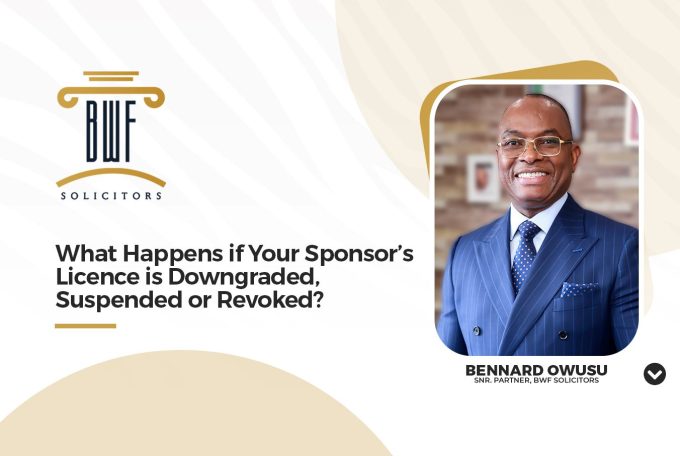Securing a Sponsor Licence has become increasingly vital for many businesses in the United Kingdom. The Sponsor Licence helps businesses to bring Skilled Workers from overseas.
If you wish to employ a person who is not a settled worker or who does not otherwise have immigration permission to work for you in the UK, you will need to be authorised by the Home Office. This authorisation is known as a ‘sponsor licence’, and employers who hold a sponsor licence are known as ‘sponsors’.
Applying for a sponsor licence can be a complex and challenging process, and any errors within this process can result in an application being rejected.
Sponsorship is based on two main principles:
sponsorship is a privilege, not a right – this means that those who benefit most directly from employing migrant workers must play their part in ensuring the immigration system is not abused, comply with wider UK law, not behave in a manner that is not conducive to the public good. Overseas nationals who apply for permission to enter or stay in the UK to work are eligible, and a trustworthy and licensed employer genuinely wishes to employ and sponsor them. When a sponsor is granted a licence, significant trust is placed in them. With this trust comes a direct responsibility to act in accordance with the UK’s immigration laws.
The Home Office will always check before deciding on your application. They would always include checking your key personnel and whether you meet your sponsor duties. The key personnel include the Authorising Officer (AO), Key Contact (KC), Level 1 User and Level 2 User.
You must always ensure that you understand your five mandatory duties:
- Reporting duties;
- Record-keeping duties;
- Complying with immigration laws;
- Complying with wider UK law;
- Not engaging in behaviour or actions that are not conducive to the public good.
The Home Office will also check that:
- The organisation is genuine and operates and/or trades lawfully in the UK.
- The organisation is based in the UK.
- Is offering a genuine vacancy which meets the skilled worker criteria.
- Has the HR and recruitment systems in place to render it capable of complying with the sponsor’s duties and responsibilities and evidencing that compliance.
- Is “honest, dependable and reliable”. This means the organisation and its owners, directors and appointed key personnel do not have any unspent criminal convictions.
- Does not represent a threat to immigration control with no evidence of any previous non-compliance by the organisation.
Any successful application will require that you also have all the tools for a successful business. Usually an SME or a startup business would have gone through the initial process of setting up using the global acceptable procedures like:
- Determine business concept.
- Research the market.
- business plan and cashflow forecast.
- Choosing the business structure.
- Registration and professional licenses.
- Finance options.
- Marketing
- How to scale up the business.
You cannot guarantee that these crucial aspects of running a small business won’t give you a headache (they almost certainly will), but by putting good strategies and solid foundations in place, you will be better able to deal with those headaches when they arrive.
Find the right funding for your business.
The livewire of every business is cashflow. Startup funding, or startup capital, is money that an entrepreneur uses to launch a new business. The money can be used for hiring employees, renting space, buying inventory, and other operating expenses that help a business get started.
Startup capital often comes in the form of self-funding, investors or small-business loans. Knowing your financing needs and business goals will help you choose the right type of startup funding for your business.
Grants and loans can provide vital funding for start-ups and small businesses in the UK.
For small businesses that need a boost, there are lots of funding schemes available to apply for in the UK.
The benefit of a grant is that, while there are terms and conditions, you never need to pay the money back.
Seed Enterprise Investment Scheme:
This small business grant fund encourages investors to put their money into new ventures by offering tax relief to those in your company. Companies can receive a maximum of £250,000 through the scheme.
The Gigabit Broadband Voucher Scheme
Businesses in rural locations can access up to £4,500 to upgrade a high-speed broadband connection.
Arts Council National Lottery Project Grants
The Arts Council offers much-needed support to organisations with a focus on creative initiatives, including theatres and galleries. Small business grants range from £1,000 to £100,000.
CRACK-IT challenges
Encouraging collaboration between businesses and academics, this competition invites small- and medium-sized enterprises (SMEs) to solve scientific or technological processes or develop a brand-new product. If your application is successful, you can secure a contract for up to three years.
Small business loans
The Enterprise Finance Guarantee (EFG): The British Business Bank introduced the government-backed EFG to help small businesses grow by guaranteeing loans of between £1,000 and £1.2 million. To be eligible, you must be based in the UK and turn over less than £41 million per annum.
NatWest Small Business Loan: NatWest offers a selection of flexible loans with contract terms of up to seven years. You can borrow between £1,000 and £50,000, but you may need to provide security or a guarantee to access funding.
Funding Circle Business Loan: Funding Circle offers business loans for entrepreneurs. You must have been in business for at least a year, and you can borrow anything between £10,000 and £500,000.
Fredericks Foundation Loans: The Fredericks Foundation supports business owners who have been unable to secure other forms of finance. If you’ve been up and running for a year, the foundation offers funding of between £20,000 and £50,000.
Once you have secured your funding, you will have to ensure that your business is ready and able to make the application for sponsorship.
Where do I start?
The following UKVI guidance may be helpful:
Home Office’s guidance for sponsors, which details the process for applying for a sponsor licence: https://www.gov.uk/government/publications/workers-and-temporary-workers-guidance-for-sponsors-part-1-apply-for-a-licence
Genuine vacancy
These days, the Home Office insists on the need for a sponsor to demonstrate that they can offer “genuine employment” that meets the skill and salary thresholds of the Skilled Worker route. The Home Office will assess whether a business truly needs the role they are wishing to sponsor, by examining the business type and the people they already employ to see if the sponsored role makes sense within their current structure.
.
The Home Office will not approve an application and will not award points for sponsorship if they have reasonable grounds to believe that the job role you are sponsoring the worker for does not exist, is a sham, or has been created mainly so the worker can apply for entry clearance or permission to stay.
Agency or working for a third party
The Home Office will not approve applications for roles that involve the hire of a worker by a third party who is not the sponsor to fill a position with that party, whether temporary or permanent; or contract work to undertake an ongoing routine role or to provide an ongoing routine service for a third party who is not the sponsor, regardless of the nature or length of any arrangement between the sponsor and the third party.
However, if the sponsor is providing service under a contract, for example, with the National Health Service (NHS) or the Local Authority, “the sponsor must be whoever has full responsibility for all of the duties, functions, outcomes or outputs of the job the worker will be doing”. An example is the Local Authority or the NHS Dynamic Purchasing System (DPS).
If the employer sponsor, employs a worker to work for a third party to fulfil a contractual obligation on their behalf, they must be contracted to provide a service or project within a certain period. This means a service or project has a specific end date, after which it will have been completed, or the service provided will no longer be operated by the employer or anyone else.
Record keeping and HR systems
Other duties, as prescribed in the Home Office’s Sponsor Guidance, are as follows:
Record-keeping
Monitoring & reporting
Absence monitoring
Notifying the Home Office of changes in circumstances
You must therefore have a robust HR system which captures all your HR functions in addition to record storage electronically.
Compliance visits
Sponsors should be aware that the Home Office can visit them as part of the sponsor licence application process to check that their systems are robust enough. This is the principal method by which the Home Office can assess the suitability criteria.
BWF Solicitors https://bwfsolicitors.com/contactus/ can help a sponsor to complete the form.
Once the online form is submitted, a fee is paid depending on the size of the organisation: £536 for a small company or a charity and £1,476 for a medium or large company.
When do I get a decision?
Decisions can take up to eight weeks but tend to come through within four to twelve weeks. The Home Office has a service to expedite a sponsor licence application for an extra fee of £500 which will ensure an application is decided within 10 working days.
A Rated Decision
The sponsor will be emailed with the result of the application and if successful, they will be granted a licence valid for four years from the date of the decision. This will usually be an “A-rated licence” which means they will be granted access to the sponsor management system via login details for the nominated user. The organisation can then start sponsoring workers.






